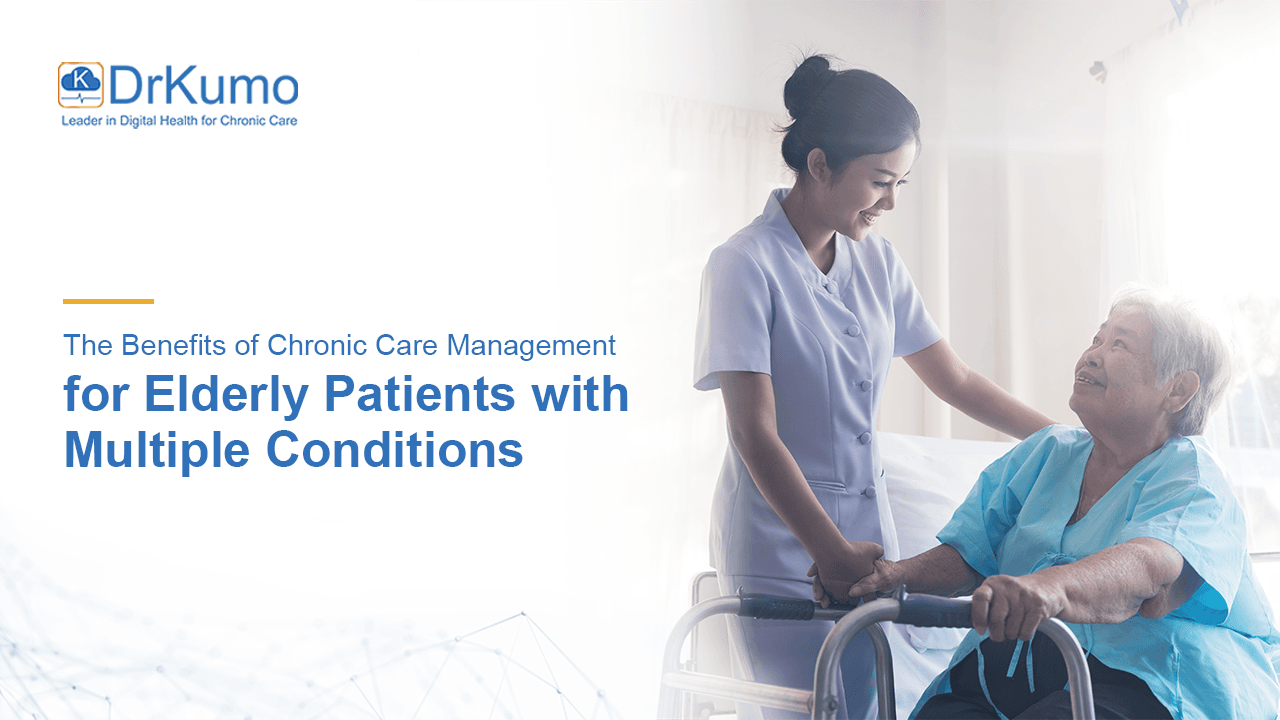Managing the health of elderly patients with multiple chronic conditions is a complex and demanding process, often involving constant adjustments and careful attention. Chronic Care Management (CCM) is a proven approach to addressing these challenges, offering a structured and personalized path to better health outcomes. According to the National Council on Aging, older adults are significantly impacted by chronic conditions, with nearly 95% having at least one chronic illness and nearly 80% living with two or more.
In this article, we will explore how CCM can make a significant difference in the lives of elderly patients, emphasizing its benefits, the role of technology, including remote patient monitoring, and the expertise required to implement effective care plans. With insights backed by industry experience and an understanding of medical protocols, this guide is designed for caregivers, healthcare providers, and anyone interested in improving elderly care.
What is Chronic Care Management?
Definition of Chronic Care Management
Chronic Care Management involves creating a structured care plan for elderly patients with two or more chronic conditions lasting at least 12 months. These plans focus on continuous care through regular check-ins, assessments, and personalized interventions.
How CCM Works
CCM operates by assigning patients a dedicated care manager, typically a registered nurse or healthcare professional, who coordinates with various specialists, monitors health metrics, and ensures the patient adheres to their treatment plan. This approach is crucial for maintaining consistency and preventing complications from unmanaged chronic conditions.
Key Components of CCM
Chronic Care Management (CCM) services encompass several essential components that work together to provide a comprehensive care plan for Medicare beneficiaries, particularly older adults with multiple chronic conditions. These services are designed to enhance communication among care team members and improve patient outcomes through personalized care and coordination. Medicare Part B covers management CCM services for patients who qualify for CCM based on their medical needs and conditions. Below are the key components of CCM:
- Personalized Care Plans: Each plan is tailored to the patient, considering their medical care needs, lifestyle, and health challenges. This ensures the right level of care—whether through home care, assisted living facilities, or nursing homes—is provided.
- Regular Health Monitoring: Consistent monitoring of vital signs and symptoms through electronic health records (EHR) helps detect potential issues early, reducing emergency visits. For seniors living in skilled nursing facilities or receiving home health services, this monitoring ensures timely interventions.
- Medication Management: CCM helps patients adhere to prescribed medications, minimizing adverse drug interactions. Clinical staff dedicate 20 minutes or more of care time each month to ensure medications align with the patient’s care plan.
- Coordination with Specialists: CCM streamlines care by facilitating communication between various providers, including specialists, home care, and personal care providers. This reduces the risk of overlapping treatments, especially for seniors managing multiple chronic conditions.
- Clinical Staff Time and Additional Support: Using CPT code 99490, CCM allocates at least 20 minutes per month of clinical staff time to patient management. For complex CCM cases requiring more extensive care, an additional 30 minutes of service may be provided. This time may include face-to-face interactions or non-face-to-face activities such as coordinating care with friends and family.
- Support for Activities of Daily Living: CCM extends beyond medical management to address activities of daily living (ADLs), such as bathing, dressing, and mobility, ensuring patients receive the right type of care. These services promote long-term care and help patients stay independent as long as possible.
Role of Healthcare Providers in CCM
Healthcare providers play a vital role in Chronic Care Management (CCM) for elderly patients, utilizing their expertise to guide them through complex care processes. By offering professional support and maintaining open lines of communication, providers empower patients to make informed decisions that enhance their health outcomes.
The Centers for Medicare & Medicaid Services (CMS) highlight that CCM services improve care coordination and patient engagement, which are critical for managing multiple chronic conditions effectively. By integrating these practices, healthcare providers not only improve clinical outcomes but also create a supportive environment that addresses the emotional and psychological needs of elderly patients, ultimately leading to a higher quality of life.
According to the National Institute on Aging, effective communication between healthcare providers and elderly patients is essential for ensuring that patients understand their care plans and feel supported throughout their treatment journey. This ongoing dialogue helps to build trust and fosters a collaborative approach to managing chronic conditions. Integrating digital health solutions is essential for effective communication, especially as remote patient monitoring (RPM) becomes more common. However, these advancements bring significant cybersecurity challenges.
As healthcare increasingly relies on technology, securing patient data is critical. Cybersecurity frameworks from organizations like NIST and NCCOE are vital for protecting sensitive health information and maintaining trust in digital health practices. Understanding the implications of RPM practices on cybersecurity is crucial for healthcare providers navigating this evolving environment.

Top Benefits of Chronic Care Management for Elderly Patients
Improved Health Outcomes
- Better Disease Management: Chronic Care Management (CCM) provides structured care plans that enhance disease management for patients with chronic conditions. For example, individuals with heart diseases benefit from consistent monitoring and timely interventions, significantly reducing the risk of acute episodes. According to the Market.us Media, the adoption of CCM programs has been steadily increasing, with a projected growth rate of 15% from 2015 to 2029, reflecting its rising importance in healthcare.
- Reduced Hospital Admissions: Research conducted by Walden University indicates that CCM can lower hospital readmission rates through continuous care and early intervention when symptoms worsen. This proactive approach not only enhances patient health but also alleviates pressure on healthcare facilities, making it a win-win for both patients and providers. For instance, effective CCM programs are designed to provide timely interventions and ongoing monitoring, which can stabilize chronic conditions and address potential issues before they escalate.
- Enhanced Quality of Life: By ensuring comprehensive and consistent care, CCM significantly improves the overall quality of life for elderly patients. Many report higher satisfaction levels and better daily functioning, which are crucial for maintaining independence and well-being.
Emotional Support and Mental Health
A critical yet often overlooked aspect of chronic care is its impact on mental health. CCM offers regular check-ins that provide emotional support, helping to mitigate feelings of isolation and depression. According to the Journal of Psychiatric Research, participants in CCM programs experience a 30% reduction in depressive symptoms. This highlights the vital role integrated emotional support plays in improving health outcomes, as mental well-being is closely linked to overall health.
Improved Medication Adherence
A study featured in the Journal of Managed Care Pharmacy emphasizes the positive effects of CCM on medication adherence. By offering reminders and clear instructions, CCM helps ensure that patients take their medications correctly, thereby preventing avoidable complications. The study found a remarkable increase in adherence rates among patients enrolled in CCM programs.
The Cost-Effectiveness of Chronic Care Management
Chronic Care Management (CCM) is proving to be a game-changer for elderly patients dealing with multiple chronic conditions. Not only does it enhance their quality of life, but it also helps reduce healthcare costs significantly. Let’s dive into how CCM achieves these impressive results.
Prevention of Complications
One of the most compelling aspects of CCM is its focus on preventing complications before they arise. For example, effective management of blood sugar levels in diabetic patients can prevent serious issues like neuropathy or kidney failure conditions that require expensive treatments and hospital stays. According to the American Diabetes Association, implementing CCM can reduce the incidence of severe diabetic complications. This proactive approach not only keeps patients healthier but also saves money that would otherwise be spent on complicated medical interventions.
Efficient Resource Allocation
CCM also excels at making the most out of healthcare resources. By coordinating care among various healthcare providers, CCM ensures that patients receive timely interventions, which helps avoid unnecessary hospitalizations and emergency room visits. A study published in the Journal of General Internal Medicine found that CCM programs led to a 15% reduction in hospital admissions and emergency department visits. Additionally, the Centers for Medicare and Medicaid Services (CMS) indicated that Chronic Care Management (CCM) services lead to an estimated annual net savings of $74 per patient each month for Medicare beneficiaries.
DrKumo Digital Health Platform Solution: Enhancing Chronic Care Management for the Elderly
DrKumo offers innovative digital health solutions that empower elderly patients with chronic conditions through effective Remote Patient Monitoring (RPM). By integrating advanced technology and real-time health data, DrKumo enhances care coordination, improves patient outcomes, and addresses the unique challenges faced by this population.
DrKumo’s platform enables healthcare providers to monitor patients’ vital signs and health metrics remotely, allowing for timely interventions and personalized care plans. This proactive approach not only helps in identifying potential health issues before they escalate but also fosters greater patient engagement and adherence to treatment protocols.
With features like automated reminders for medication and appointments, as well as easy access to healthcare professionals, DrKumo ensures that elderly patients receive comprehensive support tailored to their needs. By leveraging digital solutions, DrKumo is transforming the landscape of Chronic Care Management, making it more efficient and effective for both patients and providers.
Takeaways
Chronic Care Management (CCM) offers a structured, reliable, and compassionate approach to managing multiple chronic conditions in the elderly. By emphasizing continuous care, personalized support, and the use of advanced technology, CCM is revolutionizing elderly care delivery. This innovative model not only reduces hospital visits and enhances quality of life but also provides cost-effective solutions, making it an essential component of the healthcare ecosystem.
The impact is clear that healthcare providers equipped with the expertise and experience necessary to deliver effective care ensure that elderly patients receive the attention they need. This makes CCM a trusted approach for long-term health management.
Are you ready to transform your approach to chronic care? Discover how DrKumo’s digital health platform can elevate your CCM strategy. With our innovative tools, you can enhance patient engagement, streamline communication, and improve health outcomes like never before.
Take action today! Contact us to learn more and empower your practice with cutting-edge solutions for chronic care management!
Disclaimer: The information provided in this article is for educational purposes only and should not be considered medical advice. Always consult a healthcare professional for personalized guidance and treatment options.








